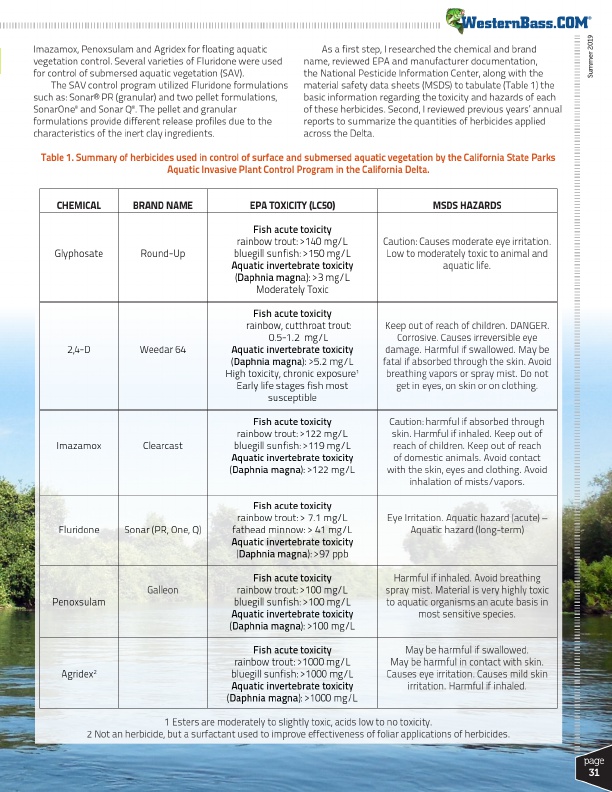
Summer 2019
Imazamox, Penoxsulam and Agridex for floating aquatic vegetation control. Several varieties of Fluridone were used for control of submersed aquatic vegetation (SAV).
The SAV control program utilized Fluridone formulations such as: Sonar® PR (granular) and two pellet formulations, SonarOne ® and Sonar Q ® . The pellet and granular formulations provide different release profiles due to the characteristics of the inert clay ingredients.
As a first step, I researched the chemical and brand name, reviewed EPA and manufacturer documentation, the National Pesticide Information Center, along with the material safety data sheets (MSDS) to tabulate (Table 1) the basic information regarding the toxicity and hazards of each of these herbicides. Second, I reviewed previous years’ annual reports to summarize the quantities of herbicides applied across the Delta.
Table 1. Summary of herbicides used in control of surface and submersed aquatic vegetation by the California State Parks
Aquatic Invasive Plant Control Program in the California Delta.
®
CHEMICAL
BRAND NAME
EPA TOXICITY (LC50)
MSDS HAZARDS
Glyphosate
Round-Up
Fish acute toxicity
rainbow trout: >140 mg/L bluegill sunfish: >150 mg/L Aquatic invertebrate toxicity ( Daphnia magn a): >3 mg/L
Moderately Toxic
Caution: Causes moderate eye irritation. Low to moderately toxic to animal and
aquatic life.
2,4-D
Weedar 64
Fish acute toxicity
rainbow, cutthroat trout:
0.5-1.2 mg/L
Aquatic invertebrate toxicity
( Daphnia magna ): >5.2 mg/L High toxicity, chronic exposure 1
Early life stages fish most
susceptible
Keep out of reach of children. DANGER.
Corrosive. Causes irreversible eye damage. Harmful if swallowed. May be fatal if absorbed through the skin. Avoid breathing vapors or spray mist. Do not
get in eyes, on skin or on clothing.
Imazamox
Clearcast
Fish acute toxicity
rainbow trout: >122 mg/L bluegill sunfish: >119 mg/L Aquatic invertebrate toxicity ( Daphnia magna ): >122 mg/L
Caution: harmful if absorbed through skin. Harmful if inhaled. Keep out of
reach of children. Keep out of reach
of domestic animals. Avoid contact with the skin, eyes and clothing. Avoid
inhalation of mists/vapors.
Fluridone
Sonar (PR, One, Q)
Fish acute toxicity
rainbow trout: > 7.1 mg/L fathead minnow: > 41 mg/L Aquatic invertebrate toxicity ( Daphnia magna ): >97 ppb
Eye Irritation. Aquatic hazard (acute) –
Aquatic hazard (long-term)
Penoxsulam
Galleon
Fish acute toxicity
rainbow trout: >100 mg/L bluegill sunfish: >100 mg/L Aquatic invertebrate toxicity ( Daphnia magna ): >100 mg/L
Harmful if inhaled. Avoid breathing spray mist. Material is very highly toxic to aquatic organisms an acute basis in
most sensitive species.
Agridex 2
Fish acute toxicity
rainbow trout: >1000 mg/L bluegill sunfish: >1000 mg/L Aquatic invertebrate toxicity ( Daphnia magna ): >1000 mg/L
May be harmful if swallowed. May be harmful in contact with skin. Causes eye irritation. Causes mild skin
irritation. Harmful if inhaled.
1 Esters are moderately to slightly toxic, acids low to no toxicity. 2 Not an herbicide, but a surfactant used to improve effectiveness of foliar applications of herbicides.
page
31